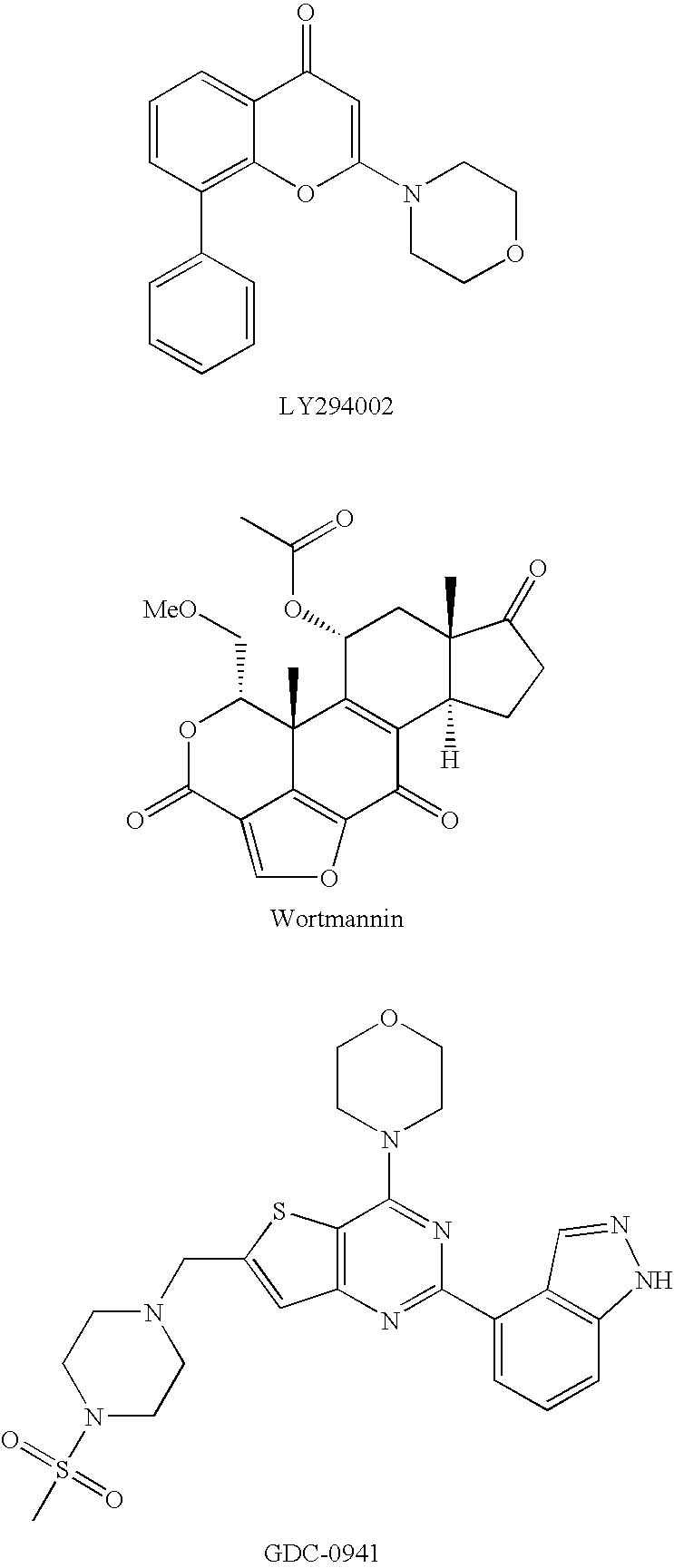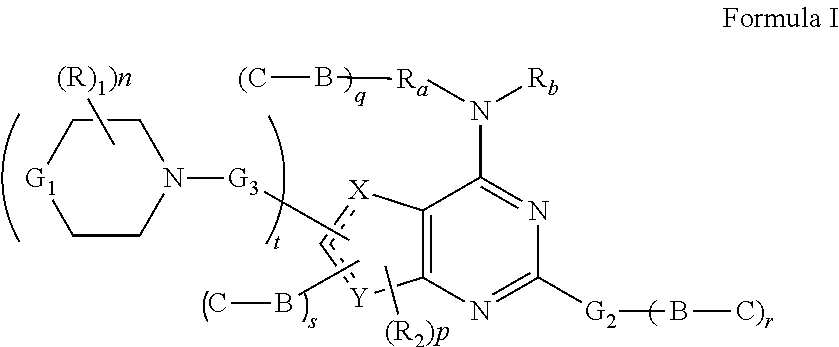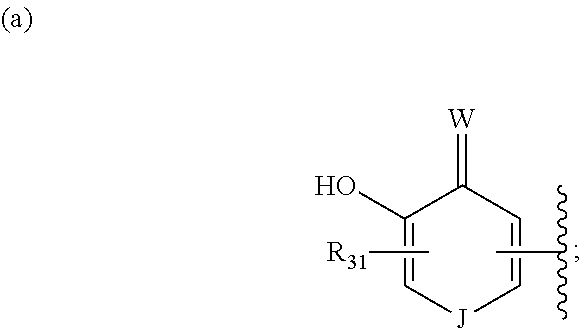Phosphoinositide 3-kinase inhibitors with a zinc binding moiety
a technology of zinc binding and phosphoinositide, which is applied in the direction of phosphorous compound active ingredients, drug compositions, biocide, etc., can solve the problems of low in vivo anti-tumor activity, oncogenic transformation and cancer, and treatment regimes using a cocktail of cytotoxic drugs often are limited by dose limiting toxicities, so as to achieve enhanced activity and effective treatment of disease
- Summary
- Abstract
- Description
- Claims
- Application Information
AI Technical Summary
Benefits of technology
Problems solved by technology
Method used
Image
Examples
example 1
Preparation of N-hydroxy-5-(4-(6-((4-(methylsulfonyl)piperazin-1-yl)methyl)-4-morpholinothieno[3,2-d]pyrimidin-2-yl)-1H-indazol-1-yl)pentanamide (Compound 3)
Step 1a: 1-(Methylthioperoxy)piperazine trifluoroacetic acid salt (Compound 0103)
[0217]A mixture of compound 0101 (10.0 g, 54 mmol), methanesulfonyl chloride (6.5 g, 57 mmol) and triethylamine in CH2Cl2 (50 mL) was stirred at reflux overnight. The reaction was cooled to room temperature and filtered. The filtrate was concentrated to give compound 0102 which was used to the next step without further purification. A mixture of compound 0102 and trifluoroacetic acid (15 mL) in CH2Cl2 (100 mL) was stirred at room temperature for 3 h. The reaction was filtered and the filtrate was concentrated to give the title compound 0103 (9.7 g, 66%) as a white solid. LCMS: 165 [M+1]+; 1H NMR (400 MHz, CDCl3): δ 2.99 (s, 3H), 3.21 (m, 4H), 3.33 (m, 4H), 8.95 (br s, 2H).
Step 1b: 4-Bromo-1H-indazole (Compound 0106-3)
[0218]To a solution of 3-bromo-2...
example 2
Preparation of N-hydroxy-3-(4-(6-((4-(methylsulfonyl)piperazin-1-yl)methyl)-4-morpholinothieno[3,2-d]pyrimidin-2-yl)-1H-indazol-1-yl)propanamide (Compound 4)
[0233]Step 2a: Ethyl 6-(4-(6-((4-(methylsulfonyl)piperazin-1-yl)methyl)-4-morpholinothieno[3,2-d]pyrimidin-2-yl)-2H-indazol-2-yl)hexanoate (Compound 0116-4) and ethyl 3-(4-(6-((4-(methylsulfonyl)piperazin-1-yl)methyl)-4-morpholinothieno[3,2-d]pyrimidin-2-yl)-1H-indazol-1-yl)propanoate (Compound 0115-4)
[0234]A mixture of compound 0114 (160 mg, 0.31 mmol), ethyl 6-bromohexanoate (83 mg, 0.37 mmol) and potassium carbonate (85 mg, 0.62 mmol) in acetonitrile (50 mL) was refluxed overnight. Solvent was removed and the residue was partitioned between dichloromethane and water. The organic layer was separated and washed with brine, dried over magnesium sulfate, filtered and evaporated in vacuo. The resulting residue was purified by prep-HPLC to give the title compound 0116-4 (40 mg, 20%) and 0115-4 (70 mg, 34%).
[0235]Compound 0116-4: an...
example 3
Preparation of N-hydroxy-7-(4-(6-((4-(methylsulfonyl)piperazin-1-yl)methyl)-4-morpholinothieno[3,2-d]pyrimidin-2-yl)-1H-indazol-1-yl)heptanamide (Compound 5)
[0238]Step 3a: Ethyl 7-(4-(6-((4-(methylsulfonyl)piperazin-1-yl)methyl)-4-morpholinothieno[3,2-d]pyrimidin-2-yl)-2H-indazol-2-yl)heptanoate (Compound 0116-5) and ethyl 7-(4-(6-((4-(methylsulfonyl)piperazin-1-yl)methyl)-4-morpholinothieno[3,2-d]pyrimidin-2-yl)-1H-indazol-1-yl)heptanoate (Compound 0115-5)
[0239]The title compound 0115-5 (110 mg, 27%) and 0116-5 (60 mg, 16%) were prepared from 0114 (280 mg, 0.55 mmol) , ethyl 7-bromoheptanoate (133 mg, 0.65 mmol) and potassium carbonate (152 mg, 1.10 mmol) in acetonitrile (25 mL) using a procedure similar to that described for compound 0115-3 and compound 0116-3 (Example 1):
[0240]Compound 0115-3 a white solid; LCMS: 670 [M+1]+; 1H NMR (400 MHz, CDCl3): δ 1.15 (t, J=7.2 Hz, 3H), 1.29 (m, 4H), 1.46 (m, 2H), 1.84 (m, 2H), 2.23 (t, J=7.2 Hz, 2H), 2.61 (s, 4H), 2.91 (s, 3H), 3.16 (s, 4H)...
PUM
 Login to View More
Login to View More Abstract
Description
Claims
Application Information
 Login to View More
Login to View More - R&D
- Intellectual Property
- Life Sciences
- Materials
- Tech Scout
- Unparalleled Data Quality
- Higher Quality Content
- 60% Fewer Hallucinations
Browse by: Latest US Patents, China's latest patents, Technical Efficacy Thesaurus, Application Domain, Technology Topic, Popular Technical Reports.
© 2025 PatSnap. All rights reserved.Legal|Privacy policy|Modern Slavery Act Transparency Statement|Sitemap|About US| Contact US: help@patsnap.com



